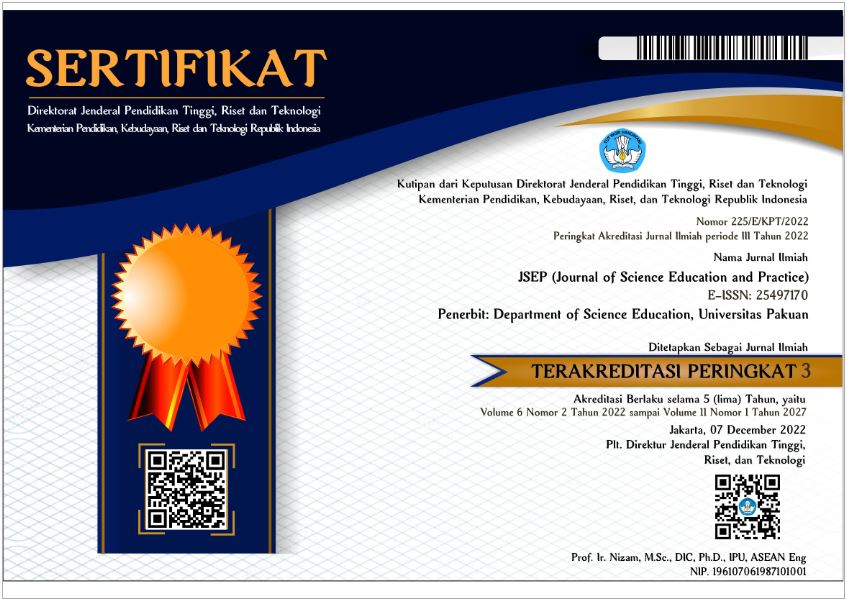ADDITIONAL MENU
Application of the Problem Based Learning Model ( PBL ) To Improve Critical Thinking Skills and Mastery of Concepts on Environmental Pollution Materials
Abstract
The Problem Based Learning Model (PBL) is a learning model that is highly recommended in the implementation of the National Curriculum. This research is to obtain an overview of the implementation of PBL in learning environmental pollution in an effort to improve critical thinking skills and mastery of concepts. This research was carried out by the quasi-experimental method, namely the pretes-postes control design. The study subjects were 73 students who were divided into control groups and experimental groups. The data obtained comes from the completion of the critical thinking test problem in the form of a description and mastery of the concept in the form of multiple choices. The results of the study explain that the acquisition of critical thinking skills with higher value PBL learning ( average - = 82.1) compared with conventional learning ( average - =61.4 ) with a calculated t value of 28.34 (p < 0.05). Mastery of concepts with PBL learning gets a higher score ( average - average = 76) compared to conventional learning ( average - 0.05<TAG. The results showed that the PBL learning model was able to improve critical thinking and mastery of the concept of students in class X environmental pollution material at Senior High School 1 Dramaga.
Keywords
References
Etherington, M. B. Investigative Primary Science: A Problem-based Learning Approach.Australian Journal of Teacher Education, 36(9), 2011
Sungur, Tekkaya, Geban. Improving Achievement Through Problem Based Learning. Middle East Technical University: Volume 40 Number 4, 2006
Etherington, M. B. Investigative Primary Science: A Problem-based Learning Approach.Australian Journal of Teacher Education, 36(9), 2011
Zabit, M.N.M. Problem-based learning on students critical thinking skills in teaching business education in Malaysia: A literature review. American Journal of Bussiness Education, 3(6), 2010
Aziz, Zain, Samsudin, Saleh. The Effects of Problem-Based Learning on Self-Directed Learning Skills among Physics Undergraduates. University of Baghdad and Universiti Sains Malaysia: International Journal of Academic Research in Progressive Education and Development January 2014, Vol. 3, No. 1, 2014
Eric Jensen. Pembelajaran Berbasis Otak: Paradigma Pengajaran Baru. Indeks: Jakarta, hlm 195, 2011
Elaine Johnson. Contextual Teaching and Learning, MLC: Bandung, hlm 183, 2011
John Santrock. Psikologi Pendidikan, Edisi kedua. Kencana: Jakarta, hal 11, 2008
Belgin, Senocak, Sozbilir. The Effects of Problem-Based Learning Instruction on University Students Performance of Conceptual and Quantitative Problem in Gas ConceptsEffects. Turkiye, 2009
Christina De Simone. Problem-Based Learning in Teacher Education: Trajectories of Change. University of Ottawa: Canada, 2014
Ajail J. B, Benjamin, Emmanuel. Comparison of the Learning Effectiveness of Problem-Based Learning (PBL) and Conventional Method of Teaching Algebra. Taraba State University, Jalingo and Faculty of Education Benue State University, Makurdi: Nigeria, 2013
Nisrina Pratiwi. Mengenal Peristiwa Alam. Jakarta: Permata Hijau, 2010
Huang kuo-shu, Wang Tzu-Pu. Applying Problem-based Learning (PBL) in University English Translation
Classes.University and Hsing Wu
College: Taiwan, 2012
Barrel, John. Problem-Based Learning: An Inquiry Approach (second edition). California. Corwin Prees, 2007
Amir, M. Taufik. Inovasi Pendidikan Melalui Problem Based Learning. Jakarta: Kencana Prenada Media, 2009
Haryono. Bimbingan Teknik Menulis Penelitian Tindakan Kelas. Jogyakarta: Amara Books, 2015
M. Fathurrohman. Model-model Pemb elajaran Inovatif. Jogyakarta: Ar-Ruzz Media, 2015
Chairul Anwar. Teori-teori Pendidikan Klasik hingga Kontemporer. Jogyakarta: IRCiSoD, 2017
Wahab Jufri. Belajar dan Pembelajaran Sains. Bandung: Pustaka Reka Cipta, 2013
Khairuntika, Yunarti. Implementasi Model Problem Based Learning dalam Mengembangkan Kemampuan Berpikir Kritis Siswa. Universitas Lampung, 2015
DOI: 10.33751/jsep.v5i1.5686
 Abstract views : 497
Abstract views : 497
Refbacks
- There are currently no refbacks.
Copyright (c) 2022 JSEP (Journal of Science Education and Practice)

This work is licensed under a Creative Commons Attribution 4.0 International License.












